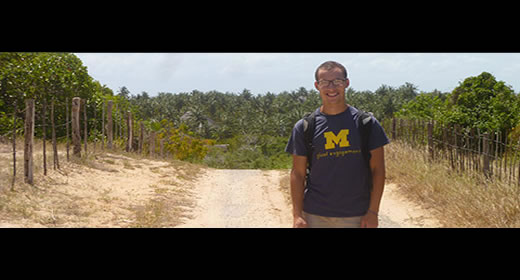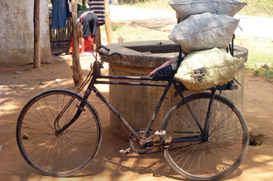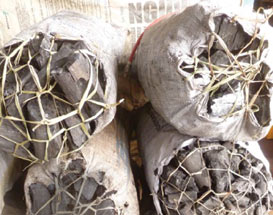
By William Foreman
Zach Petroni (BA '13) believes that to truly know something, you have to experience it. So that's why he spent some time working as a charcoal hauler in Kenya, loading huge bags of the fuel on a rusty fixed-gear bike and pedaling it 20 miles into town.
He's in Africa as the first recipient of the Raoul Wallenberg Fellowship—a $25,000 award named after one of the University of Michigan's most heroic alumni. The annual fellowship allows graduating seniors to carry out explorations, projects, or activities anywhere in the world.
Petroni is studying how local people deal with conservation efforts in their own backyards. In the West, conservation is often viewed to be a positive, moral effort—saving a forest or protecting a herd of elephants, Petroni says. But for the local population, it often means losing a home, farm field, or job that leads to a deeper plunge into poverty.
As he travels in Kenya, Petroni can afford to stay in guesthouses or budget hotels. But he says this would prevent him from better understanding how life is really lived in Kenya. So he stays with families instead.
 |
|
Carrying charcoal to market by bicycle |
It was a chance encounter that led Petroni to the temporary job hauling charcoal. He was walking with a friend in a rural area on the central coast of Kenya, about an hour and a half from Mombasa, the country's second-largest city. His friend introduced him to another friend, a charcoal hauler who Petroni simply calls John to protect his privacy. John invited Petroni home and the student stayed with his family for four days in a mud-clay house with a corrugated steel roof. The living space for the family of eight was as big as three dorm rooms. Meals usually included corn meal porridge called "ugali" with boiled greens and a bit of fish or chicken.
"I got to see firsthand and experience his struggle and how he does it in good faith, with nothing but love in his heart and for everyone else," Petroni said. "He makes on average 800 or 1,000 shillings ($9 or $11.50) a day and he'll send 500 shillings of that to his son every day to pay for his school fees."
 |
|
Charcoal bundles |
Petroni hauled charcoal with John for two days, and the work provided valuable insights for his research. Much of the charcoal wood came from a protected forest, so John was technically involved in a network of illegal activity that the government and international organizations want to crack down on.
Through John, Petroni was able to meet the other links in the charcoal chain, including the producers, and this enabled him to gain a more comprehensive understanding of the importance of charcoal to those in the area.
The underlying theme of Petroni's Wallenberg proposal was to question conservation in a firsthand way. His fellowship is almost over, and he still hasn't reached a conclusion.
"The more time I spend, I don't think there's a black or white conclusion. It's all just shades of gray," he said. "Conservation is very place specific. In one place it can be this. In another place it could be the polar opposite. I just think my understanding of conservation has become more nuanced."
Read Zach Petroni's (BA '13) description of the conservation challenges in Arabuko-Sokoke Forest, and the social challenges faced by adjacent communities at http://fordschool.umich.edu/news/?news_id=1345.
A longer version of this article appears on the University's Global Michigan website, global.umich.edu.
Below is a formatted version of this article from State & Hill, the magazine of the Ford School. View the entire Spring 2014 State & Hill here.